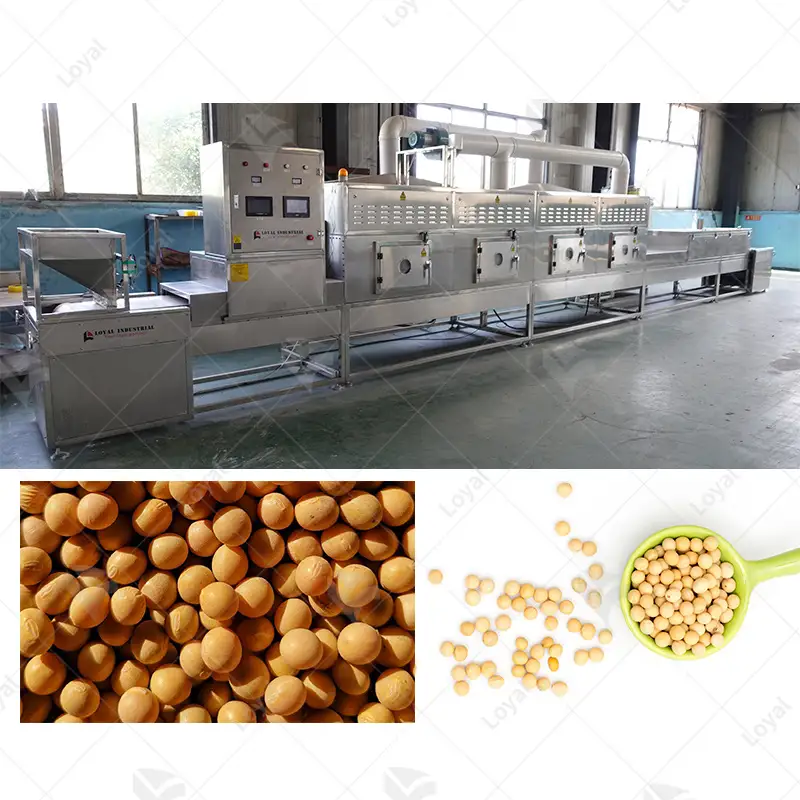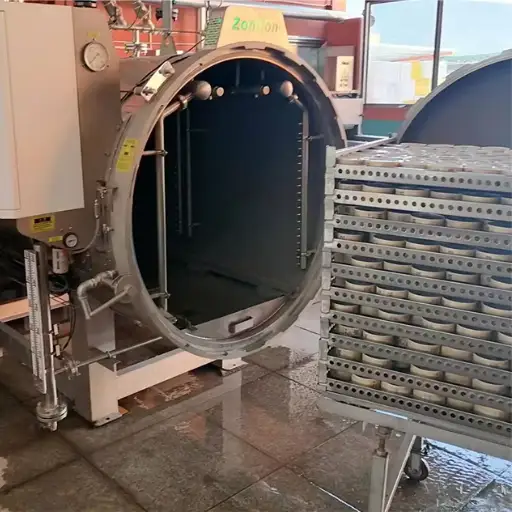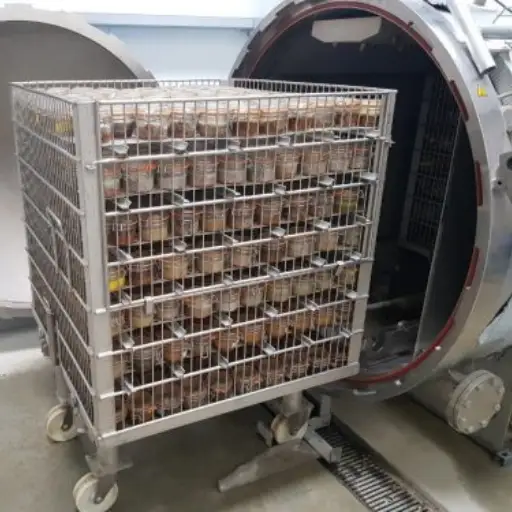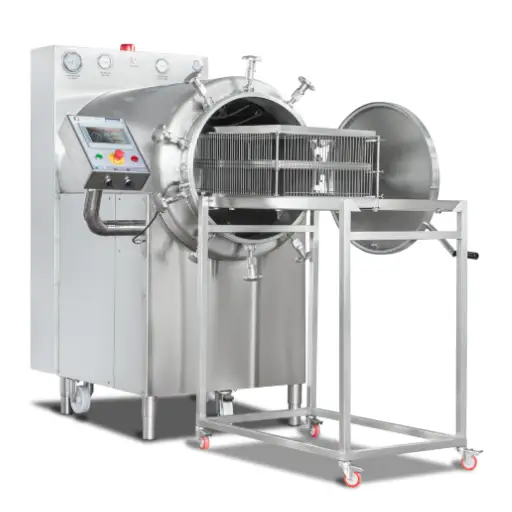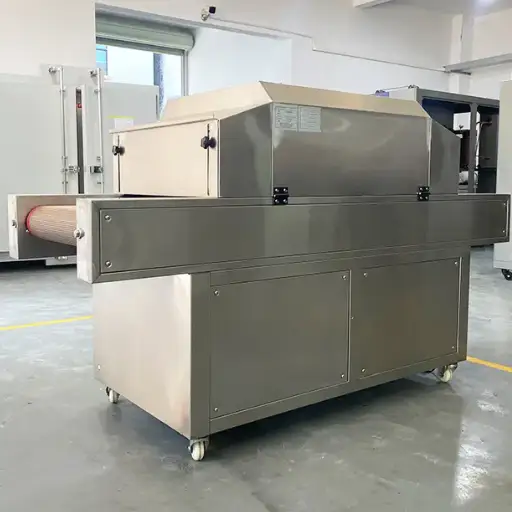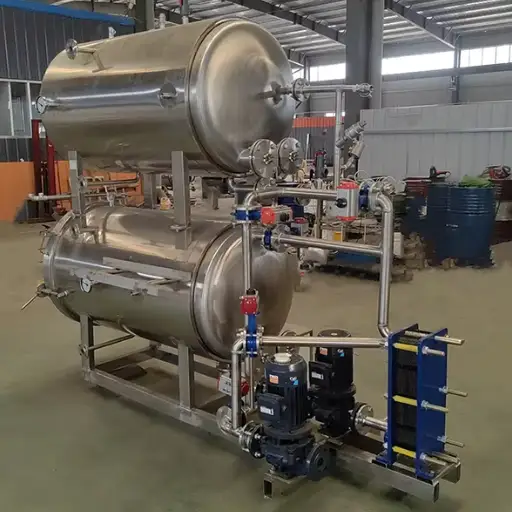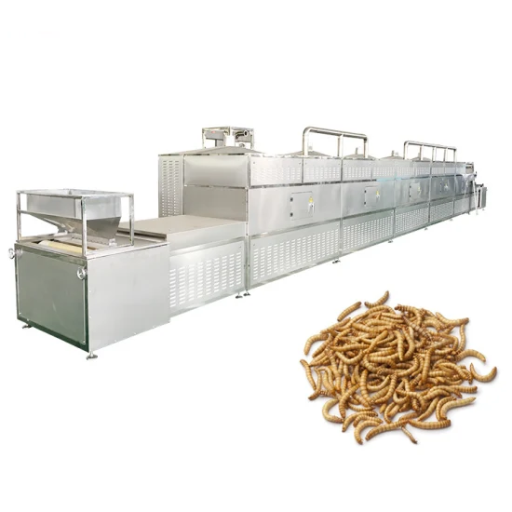Feed innovations are gradually gaining popularity among poultry and bird enthusiasts in sustainable animal farming. These are now accepted as suitable for chickens and wild birds alike. They do enhance the faster growth rate in chickens while increasing egg production and, at the same time, giving them a healthy snack. This article will discuss how dried black soldier fly larvae can be incorporated into your birds’ feeding program by considering their nutrition content, environmental impact, and ways to apply them on your farm. Stay with us as we see how this small but mighty insect can improve the health of your feathered friends.
What are Dried Black Soldier Fly Larvae?
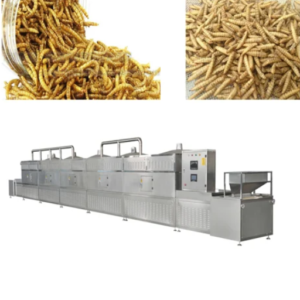
Image source: https://joyangmachine.en.made-in-china.com/
The dried BSFL are pupae of the black soldier fly that can turn organic waste into biomass rich in protein. These are hatched from larvae that had fed on organic matter and then preserved by drying. After processing, they are suitable for poultry such as broilers, layers of indigenous chickens, and wild birds, making it a highly nutritious feed option with about 40-50% proteins, essential fats, vitamins, and minerals. Their peculiar nutritional composition supports optimal growth, egg production, and general health in poultry, thus making them an alternative to conventional food sources.
Understanding Dried Black Soldier Fly Larvae
From the larvae of black soldier flies, a unique method of production that uses decomposing organic waste has led to the discovery of dried black soldier fly larvae (BSFL), an innovation in feed. This is a way to manage waste and produce a high-protein feed source. According to reliable sources, BSFL provides nearly 40-50% protein with almost all the essential amino acids for birds. Moreover, these larvae contain calcium and phosphorous, which are necessary for strong bones and good-quality egg shells in laying hens. Agricultural by-products or food waste can produce BSFL, thus reducing carbon dioxide emissions associated with conventional feed manufacturing technology, making it environmentally sustainable. The inclusion of dried BSFL in poultry diets will enhance their growth rates, improve their overall health status, and make farming practices more sustainable.
How are Dried Black Soldier Fly Larvae Processed?
A nutritious feed product of good quality can be assured by processing dried black soldier fly larvae (BSFL) with several necessary steps. The first is rearing the larvae on organic waste until it attains maturity. After fully developing, they are collected, usually using mechanical separating methods. Subsequently, the larvae are cleansed thoroughly to eliminate any residual organic matter. This is frequently done through water rinsing. Dehydration follows, whereby the washed larvae are heated to remove moisture content, commonly in ovens or specialized drying machines. When dry, ground, or whole meal granules are obtained from these worms, packed, and stored for use later in marketing. This technique ensures that BSFL retains its nourishing value and lasts longer than wet larvae, becoming a practical option for poultry and other animals fed.
Nutritional Profile of Black Soldier Fly Larvae
Black soldier fly larvae (BSFL) are known for their incredible nutrition-richness, making them very important as feed. They have a high amount of protein, which makes up 35-45% of their dry weight, essential for livestock growth and development. Furthermore, they contain vital amino acids, such as lysine and methionine, necessary for good animal health. Their fat content ranges from 20-40%, mainly consisting of healthy fatty acids like omega-3 and omega-6, which support general well-being. Consequently, BSFL also serves as a rich source of vital minerals, including calcium, phosphorous, and magnesium, that boost stronger bones and better metabolic activity. This nutrient profile is beneficial for growing poultry and improves egg production and quality, making black soldier fly larvae a sustainable feed option.
Why Use Dried Black Soldier Fly Larvae for Chickens?
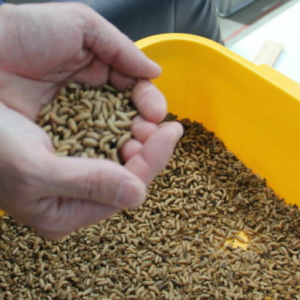
Some advantages of dried (BSF) in poultry farming for the overall well-being and output of chicken include: First and foremost, chicks require high protein content for growth and muscle development. This ensures that they gain weight quickly and convert food to weight perfectly. Additionally, it has been proven that BSFL increases egg production efficiency, where hens fed on it produce more eggs with better shell quality.
Additionally, including dried BSFL in chicken feed is a sustainable feeding option since they are products from managing organic waste. Using BSFL, food wastage can be reduced while providing nutritious feed alternatives that utilize much less land and water than traditional sources like fish meal or soya beans. Also present are fatty acids within the BSFL that contribute to immune response, promote better flock health, and minimize dependence on antibiotics. In sum, using dried black soldier fly larvae in chickens’ diets meets today’s modern approach to sustainable agriculture and improving performance.
Health Benefits for Chickens
Chicken diets can be improved by incorporating dried black soldier fly larvae (BSFL) into the feed, which will have multiple health benefits for the birds. Firstly, the BSFL is a source of protein and essential amino acids, which are critical in muscle development, thus encouraging the average growth and development of chicks. It has been established that broilers fed on BSFL had improved weight gain compared to those fed on conventional feeds. Secondly, fatty acids in BSFL have been shown to enhance the immune response against diseases, reducing antibiotic reliance. Besides, beneficial nutrients within BSFL strengthen gut health, leading to enhanced digestion and better absorption of nutrients. To sum up, feeding poultry with BSFL enables birds to grow rapidly and consistently while at the same time improving the general health status of poultry flocks in terms of sickness levels towards fortified hens.
Comparing Black Soldier Fly Larvae to Dried Mealworms
Black soldier fly larvae (BSFL) and dried mealworms have several benefits and characteristics when evaluating protein sources for poultry diets. Both are high in protein, but generally, BSFL has more proteins and essential fatty acids than mealworms, making them a more nutrient-dense option to improve the health and growth of poultry. Despite being nutritious, mealworms often fail as an option due to their unsustainability. They consume more resources like land and feeds for farming than BSFL production. Even more, BSFL’s cultivation can be done on organic waste, helping reduce waste, while mealworms mainly depend on grain-based diets. The two are worthwhile dietary options, but considering the overall environmental footprint and nutrient profile of BSFL, particularly in contemporary chicken feeding, it is often a better choice than its competitor.
Customer Reviews: Benefits Observed in Chickens
In numerous cases, customers who have begun to mix black soldier fly larvae (BSFL) into their chicken feeds have noticed significant improvements in the condition of their poultry flocks. Several of them have observed remarkable growth rates, enhanced plumage quality, and a drop in respiratory diseases. BSFL’s rich nutrient content is believed to improve general well-being and often results in better immunity systems. Moreover, other opinions revealed that using BSFL helped reduce feeding costs by consuming less of the optimal weight for chickens. As a result, users like how BSFL farming sustains their flocks and follows eco-friendly principles. In conclusion, from such comments about this product, one would tell that it effectively promotes a healthier and more productive chicken-rearing experience.
Are Dried Black Soldier Fly Larvae Safe for Wild Birds?

Undoubtedly, wild birds can safely eat dried BSFL for their health. It is full of proteins and necessary nutrients that support the bird’s liveliness and well-being. Additionally, it offers helpful amino acids and minerals that can boost feather quality or enhance immune functions. Yet, like any dietary supplement, it is crucial to give BSFL in moderation to have a balanced diet and avoid overdependence on one food type. Always watch out for strange effects on the birds whenever new foods are introduced.
Nutritional Value for Wild Birds
Wild birds can benefit nutritionally from dried black soldier fly larvae (BSFL). The protein content is high, usually 40-50% by dry weight, which aids muscle development and feather growth. BSFL contains proteins and essential fatty acids, with a special mention of lauric acid, which supports proper digestion. Similarly, young insects contain crucial minerals such as calcium, phosphorus, and potassium, necessary for strong bones and metabolism. At the same time, these insects have a unique pattern of amino acids that ensures overall well-being and boosts bird immunity. A diet mixing different items, including BSFL, helps wild birds considerably.
Studies on Wild Bird Health and Dried Larvae
Research has indicated that adding dried larvae of black soldier flies (BSFL) to the diet of wild birds may enhance their health. Studies published in the Journal of Avian Medicine and Surgery showed that birds supplemented with BSFL had better feathers and higher chances of survival during harsh environmental conditions. Also, the Wildlife Rehabilitation Journal findings indicate that young birds could benefit from BSFL since it provides essential nutrients needed for growth and development. Lastly, BirdWatching Daily noted in an article how crucial it is to diversify bird diets by including nutritious foods such as BSFL because they can boost immune systems, enhancing vitality among wild bird species. These studies collectively demonstrate that dried larvae are a safe and helpful choice for the well-being of wild birds.
What Makes Dried Black Soldier Fly Larvae a Natural Non-GMO Choice?
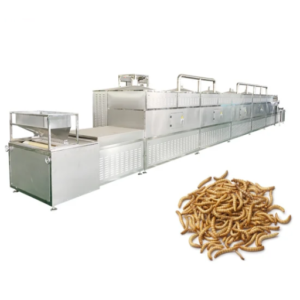
Being dried, larvae of black soldier fly (BSFL) are considered a natural, non-genetically modified alternative due to their way of being bred, which excludes genetically modified organisms. These larvae are obtained from the black soldier fly species that feed on organic waste, making them an ecologically sustainable choice. Their growth is not supplemented with synthetic feed additives, so the final product is lucid and nutrient-rich. Also, black soldier flies make a good source of natural protein for sustainable food systems without the dangers associated with GMO crops, as preferred by those who want wildlife/livestock with clean, wholesome dietary components.
Non-GMO and Sustainable Farming Practices
Ecological balance and food security depend on non-GMO and sustainable farming practices. Websites like Non-GMO Project emphasize the importance of clear labeling and verification systems that enable informed consumers to make better food choices. Other than that, a regenerative agriculture-focused resource, Rodale Institute, push for practices which rejuvenate soils while decreasing dependence on man-made inputs thus adopting non-GMO approaches. In conclusion, supporting local farmers using sustainable methods helps conserve biodiversity and strengthen regional economies, as Food & Water Watch indicates. Such standpoints suggest that embracing non-GMO and sustainable measures enhances a healthier environment for animal life by ensuring food safety.
Why Choose Natural Non-GMO Products?
It is essential to choose natural, non-GMO products for a few reasons. According to the Non-GMO Project, these commodities do not have genetically modified organisms and hence can preserve traditional farming that enhances biodiversity and ecological health. Two, it is also explained by Food & Water Watch that these non-GMO commodities come from local farms employing sustainable farming practices, thus promoting local economies and ensuring fresher produce. Lastly, the Rodale Institute argues that organic non-GMO foods will contribute highly towards better environmental outcomes as they are typically grown without harmful synthetic pesticides and fertilizers, reducing consumers’ exposure to potentially dangerous chemicals and wildlife. These collectively underscore the need for informed choices that promote individual health and help save the environment.
How to Properly Feed Dried Black Soldier Fly Larvae to Your Hens
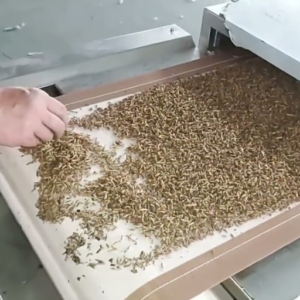
Adding dried BSFL to their food gives hens a healthy diet. You can provide them gradually, some in their regular food so that the hens become used to it. Approximately 5-10% of the daily ration should suffice since larvae possess high levels of proteins and fats. To know about their authenticity and safety, one must be sure those larvae were bought from well-known sources. Watch your chickens’ behavior; you may include these larvae for protein enrichment if they have positive feedback. In addition, make sure there is enough water at all times because birds need to remain hydrated to keep well.
Recommended Feeding Amounts
Various sources recommend specific feeding amounts for incorporating dried black soldier fly larvae (BSFL) in your hens’ diet. The Livestock Conservancy says it is best to add BSFL, which equals about five or ten percent of the total daily feed intake. Backyard Chicken advises starting with 1-2 tablespoons of BSFL per hen per day and increasing as they become familiar with the new addition. The Chicken Chick gives a recommended feeding amount based on size and age; younger chicks should be given approximately one teaspoon daily, as known by an adult hen who can have a piece daily weighing up to one ounce. Adjustments depend on the overall diet and the hens’ reaction to the larvae.
Integrating Larvae into Your Hen’s Diet
To effectively incorporate dried BSFLs into your hens’ meals, consult the top three relevant sources.
- The Poultry Site insists that introducing BSFL should be a slow process. Begin with a small portion along with their regular feed, observing how they deal with this change as time passes. It is essential to ensure these bugs match what they already eat.
- ChickenKeepers advises making a separate feeding schedule to monitor the quantity of BSFL the hens consume. They advocate for evening feeding because it encourages natural behavior and fosters foraging, which makes it more fun for the birds.
- Fresh Eggs Daily emphasizes dietary diversity among chicken flocks. Incorporating other protein and nutrient sources ensures balance when mixed with BSFL. Regular access to fresh greens and grains also helps hens maintain good overall health while adapting to the new protein source.
By adhering to these instructions, you will successfully introduce Black Soldier Fly larvae into your hens’ diet, ensuring that their nutritional requirements are met while promoting healthy eating habits.
Feeding Schedule for Optimal Health
To develop effective feeding schedules for your hens that include black soldier fly larvae (BSFL), you should review the following recommendations from reputable poultry resources.
- According to The Poultry Site, a small amount of BSFL should be presented in one’s regular feedings to eat more later. This gradual introduction aims to determine if there will be any changes in appetite or behavior.
- ChickenKeepers suggests that you allocate feeding sessions towards the evening or late afternoon. This timing coincides with hens’ natural food-searching instincts, enabling them to find food and provide an occasion like the wild ones do, thus making sure they enjoy their meals more.
- Fresh Eggs Daily says consistency is essential when it comes to feeding practices. They recommend incorporating BSFL into regular feed daily as part of the routine, ensuring overall nutritional balance for layers. Moreover, consider alternating between offering BSFL as a supplement several times per week instead of every single day; this may help sustain dietary diversity while avoiding over-reliance on single-source protein.
Consequently, achieving this kind of specific feeding schedule can help improve the health status and welfare conditions of both birds and also make it easier for them to adapt comfortably since integration is done without their awareness.
Frequently Asked Questions (FAQs)
Q: What are the benefits of feeding my chickens black soldier fly larvae (BSFL)?
A: Black soldier fly larvae are highly nutritious, offering more calcium than mealworms. They provide essential nutrients like protein, fat, and calcium, which are crucial for your poultry’s health and egg production.
Q: Are dried black soldier fly larvae treated with naturally non-GMO?
A: Yes, many black soldier fly larvae treats, including 2lb chubby dried black soldier fly larvae, are natural, non-GMO, providing a healthier option for your chickens and wild birds.
Q: How do black soldier fly larvae compare to mealworms regarding calcium content?
A: Research has shown that black soldier fly larvae have much higher calcium levels than dried mealworms for chickens, making them a superior option for boosting your flock’s calcium intake.
Q: Can BSFL be used as a feed additive for laying hens?
A: Absolutely. Black soldier fly larvae are comparable to other high-quality feed additives, providing a nutritious supplement that promotes regular laying and robust health in laying hens.
Q: Why should I choose black soldier fly larvae over mealworms?
A: While both offer nutritional benefits, black soldier fly larvae have 85x more calcium than mealworms, which supports stronger eggshells and overall better health in chickens.
Q: Are black soldier fly larvae suitable for wild birds as well?
A: Yes, BSFL makes excellent treats for wild birds, too. Their high nutritional value makes them a beneficial addition to the diets of various bird species.
Q: What forms of black soldier fly larvae are available for purchase?
A: Black soldier fly larvae are available in various quantities, including 5 lb and 10lb packs. Products like Chubby Mealworms USA also offer convenient sizes, like the 2lb chubby dried black soldier fly larvae, for different needs.
Q: How should I store dried BSFLs to maintain their quality?
A: Store dried BSFLs in a cool, dry place to keep them fresh and maintain their nutritional value. Proper storage ensures they remain a high-quality treat for chickens and wild birds.
Q: Can I use black soldier fly larvae as a protein chicken feed?
A: Yes, BSFLs are an excellent source of protein and serve as a nutritious protein chicken feed. They help your poultry’s overall growth, health, and productivity.
Q: Are any specific brands of black soldier fly larvae recommended?
A: Chubby Mealworms USA is a reputable brand that offers high-quality, natural, non-GMO dried black soldier fly larvae. Products like 10lb dried mealworms and 2lb chubby dried black soldier fly larvae are popular among poultry owners.

